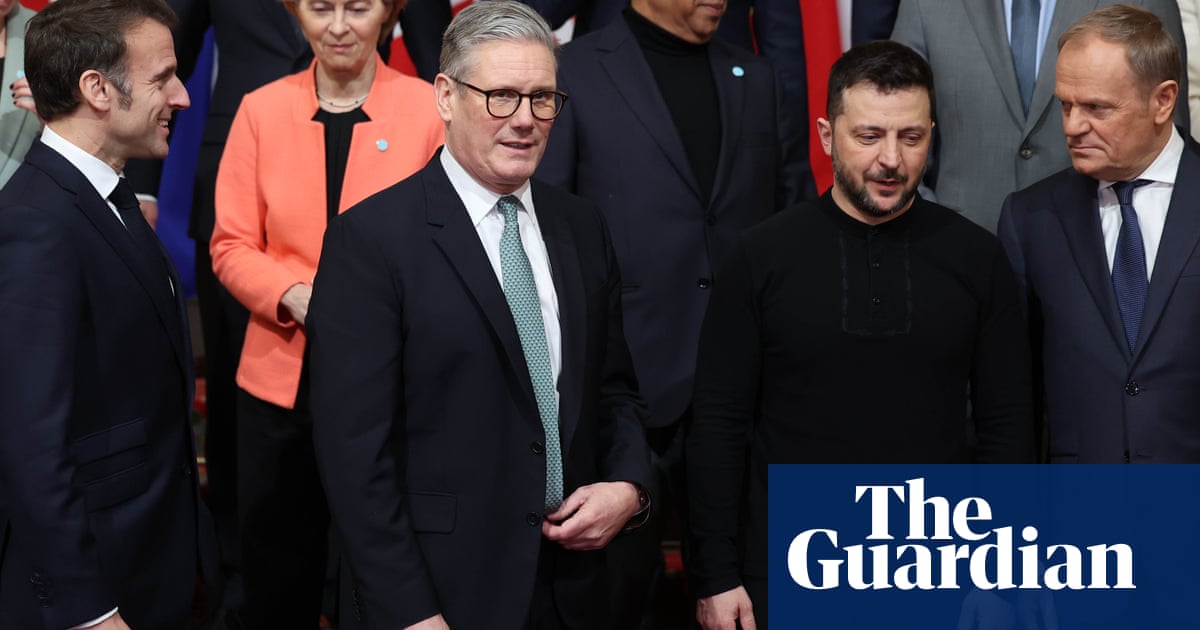The leaders of Britain, France, Germany and Poland are due in Kyiv on Saturday for a symbolic visit to Ukraine,a day after Vladimir Putin hosted a set-piece military parade on Red Square. The visit comes as the US warned of intelligence about a big impending air attack on Ukraine.
Keir Starmer,Emmanuel Macron, Friedrich Merz and Donald Tusk are expected to arrive in Kyiv early on Saturday and will meet the president, Volodymyr Zelenskyy, in a show of support for Ukraine, Downing Street said in a statement issued late on Friday.
“We, the leaders of France, Germany, Poland the United Kingdom will stand in Kyiv in solidarity withUkraineagainst Russia’s barbaric and illegal full-scale invasion,” the four leaders said in a joint statement.
The four European leaders will reiterate calls for an unconditional 30-day ceasefire in the conflict during their visit, something that Donald Trump and the US administration have said could be the first step on the way to a sustainable peace deal. Ukraine has said it is ready to implement butRussiahas so far refused.
Instead, Moscow unilaterallydeclared a three-day ceasefire beginning on 8 May, which Kyiv said was designed to avoid Ukrainian drone attacks on Russia during celebrations of 80 years of the Soviet victory in the second world war, held in Moscow on Friday. Fighting has continued along the frontlines during the supposed ceasefire, both sides have said, but Russia has largely refrained from drone and missile attacks on Ukraine.
However, as the leaders were already en route to Ukraine, the US embassy inKyivput out a public warning late on Friday night that it had received intelligence of a “potentially significant air attack that may occur at any time over the next several days”. It did not give further details.
The four European leaders are expected to visit Kyiv’s Maidan on Saturday morning, where thousands of flags have been planted to remember those who have been killed in the war with Russia, before sitting down with Zelenskyy. Later, Downing Street said the five would beam into a virtual meeting to update other leaders on progress being made for a so-called “air, land, maritime and regeneration force” that is planned to be part of a peace deal.
“We are ready to support peace talks as soon as possible, to discuss technical implementation of the ceasefire, and prepare for a full peace deal,” said the statement.
“We will continue to increase our support for Ukraine. Until Russia agrees to an enduring ceasefire, we will ratchet up pressure on Russia’s war machine.”
Sign up toThis is Europe
The most pressing stories and debates for Europeans – from identity to economics to the environment
after newsletter promotion
On Friday, thousands of troops marched through Red Square as Putin held his annual Victory Day parade. Numerous world leaders attended, most notably China’s Xi Jinping, and the Brazilian president, Luiz Inácio Lula da Silva.
Robert Fico and Aleksandar Vučić, prime minister of EU member Slovakia and president of EU hopeful Serbia respectively,also attended the parade, drawing irritation from other European leaders.
“All those who truly support peace cannot stand side-by-side with Putin. Those who truly support peace should be in Ukraine tomorrow, not Moscow,” said the EU’s top diplomat on Thursday. Foreign ministers from numerous EU countries, as well as Britain’s David Lammy, travelled to Lviv on Friday, to announce the foundation of a tribunal for Russian war crimes in Ukraine.
Saturday’s visit to Kyiv is likely to focus more on finding a common western position on Ukraine to take to Donald Trump, as European leaders try their best to keep the US onside. The Trump administration has so far appeared to be much tougher on Kyiv than Moscow, but there are some small signals that the mood in Washington might be changing, after a positive meeting between Trump and Zelenskyy in the Vatican on the sidelines of the Pope’s funeral.
Even vice-president JD Vance, seen as the most sceptical of voices on support for Ukraine,has criticised Moscow’s stancein recent days. “Right now, the Russians are asking for a certain set of requirements, a certain set of concessions in order to end the conflict. We think they’re asking for too much,” he said on Wednesday.
